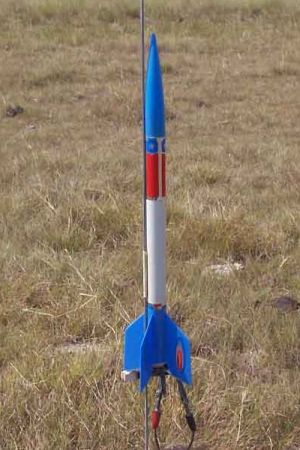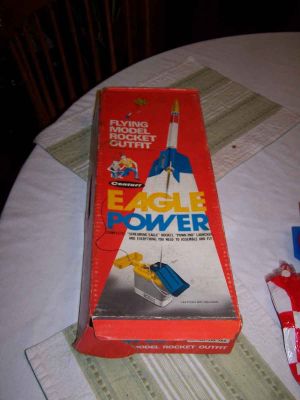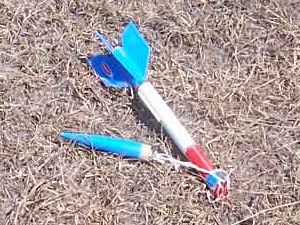Centuri Screaming Eagle
Centuri - Screaming Eagle {Kit} (5173, KF-3) [1973-1983]
Contributed by John Lee
| Construction Rating: | starstarstarstarstar_border |
| Flight Rating: | starstarstarstarstar_border |
| Overall Rating: | starstarstarstarstar_border |
Brief:
This is an OOP 4FNC beginner rocket powered by 18mm motors and uses parachute recovery.
My entry into rocketry came in the mid 70s when I was in 6th grade. I got a Centuri Screaming Eagle starter set. I remember knowing that it was not going to go as high as the Saturn Vs I had watched land on the moon but being cynical enough to wonder whether it would do any better than the water pump rockets my parents had hitherto limited me to. I remember also being amazed at how well it did fly, especially on a C6-7. I was well aware of how my clumsy little fingers were ill suited to anything requiring craftsmanship and still, the rocket did well. I was hooked.
I managed to keep that rocket and not lose it throughout my earliest incarnation as a rocketeer. I also remember throwing it out when I headed out for college. Since becoming a BAR, I have often wistfully thought of it, wishing I still had it. I checked eBay looking for it.
I saw Screaming Eagles several times but they always went for more than I was willing to pay. And then I seemed to hit it just right. I found one listed as new and unopened and I won it. I was so excited.
I noticed there was a problem as soon as the postman delivered it. It had clearly been opened. I opened it myself and...the box contained an assembled rocket, an old Centuri B4-6 motor, the instructions for the rocket, and a stage coupler. The launch controller and launch pad were missing.
I probably never would have used that old 6V system, but I was miffed. At least I had the rocket. I pulled out the nosecone and found that the chute was in good shape but that the little sticky thing Centuri used to use for shock cord mounting had dried out long ago.
Still, I had the rocket.
I decided to try to write a review of it based upon memories more than 30 years old and the aid of the instruction set.
At least I have the rocket.
Construction:
The rocket kit should have contained:
- a motor hook
- an engine tube
- a plastic fin unit
- a thrust coupler (elongated thrust ring)
- a centering tube
- a body tube
- a plastic nose cone
- a launch lug
- a plastic parachute kit.
As far as I could tell, all was present.
Construction begins with the installation of the engine hook in the engine tube. The engine tube is then glued into the plastic fin can making sure that the engine hook is aligned with the slot on the can.
The thrust coupler is then glued into the engine tube so that its end rests against the engine hook.
The centering tube is then glued on top of the thrust coupler. All it really does is get things back to the proper diameter to fit withing the body tube and it is not visible in the finished rocket. The body tube is then glued on to the centering tube.
The plastic parachute is assembled in the standard way but the elastic shock cord is supposed to be fed through a self-adhesive thingamajig which attaches to the inside of the upper end of the BT. As I said, mine was dried out and pulled right out. I fashioned an Estes style tri-fold mount and glued the shock cord in that way. The launch lug was glued to the body and construction was complete.
PROs: Easy, fast
CONs: I didn't get to do it myself
Finishing:
The fin can and nose cone are both plastic and pre-colored blue. The body tube is white. The kit comes with some red,
white, and blue stickers to make it look more finished. One of these is a wraparound pattern for just aft of the nose
cone. I do recall that whoever put this one on got it much straighter than I did in the 70s.
PROs: it looks good and is easy.
CONs: stickers instead of decals
Construction Rating: 4 out of 5
Flight and Recovery:
My memory from childhood says this is an excellent and resilient flier, forgiving of bad choices. My experience with
this incarnation is the same thus far.
For the first launch, I did not have a specified motor so I used an A8-5. It boosted straight but not too high. The delay was too long and it was on its way down before it ejected. It came down without any problems.
For the second flight, I decided to use the old Centuri motor that came in the box. It was a B4-6. I finally decided that the yellow Estes plug was the best fit and took it out to the pad. When I punched the button nothing happened and I kept holding it down. Eventually, I released it and then pressed it again, holding it down. About 5 seconds into it, it seemed longer, I thought I saw a puff of smoke and released the launch button. I turned back to my range box to get another igniter and stopped to say something to somebody. That is when the rocket decided to take off. It flew VERY high and was just a speck in the sky. It coasted for a while and then started back down. Then we all saw the ejection puff but no chute. It descended rapidly until we could tell that the nosecone had separated but the chute had not ejected. It landed a few yards away without any damage at all.
When I get another opportunity in a large field, I am going to try a C6-7.
Flight Rating: 4 out of 5
Summary:
I miss the Centuri line. It was an excellent introduction for me to rocketry way back when and would do the same job
today. While simple, the kit is marginally more complicated than many of today's beginner kits and you felt as if you
had really built it.
Overall Rating: 4 out of 5
 |
 |
Flights
Date | Flyer | Rocket | Altitude |
|---|---|---|---|
2022-04-23 | Tim Dawson | Screaming Eagle | 180 Feet |
2022-03-05 | Tim Dawson | Screaming Eagle | 150 Feet |
2022-01-22 | Tim Dawson | Screaming Eagle | 400 Feet |
2021-07-17 | Tim Dawson | Screaming Eagle | 590 Feet |
2021-05-22 | Bill Eichelberger | Centuri Engineering Co. - Screaming Eagle | 1,100 Feet |
Sponsored Ads
 |
 |














